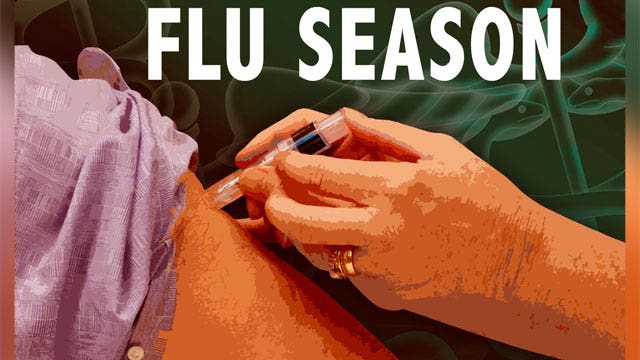There is no convenient time to get sick. And when it comes to the flu, it always seems to arrive at the worst possible time.
Don’t get caught thinking flu season is over now that the holidays are done. According to the Centers for Disease Control and Prevention (CDC), flu season usually peaks between November and March. So there are still plenty of opportunities to get sick.
Related: What you need to know about the flu this year
The flu is a respiratory illness caused by the influenza virus, which affects your nose, throat and lungs. Doctors recommend that you get vaccinated each year to prevent the flu.
As a health advocate, I don’t recommend either receiving the vaccination or not. I believe it’s a matter of personal preference based on your own health history and tolerance for being sick if you do catch the flu.
Unfortunately, getting vaccinated is no guarantee that you won’t get the flu anyway. If it was, I’d bet we’d all choose to get the shot. However, according to the CDC, only 42 percent of people in the U.S. were vaccinated last year, which is fewer than the year before.
If you are concerned about whether the flu is prominent in your area, or if you want to check ahead before you travel, there is a website that can help. Visit flufacts.com and put in a zip code to see how bad the flu is in a particular location.
I have to admit, I have not had a flu shot or gotten the flu for the last several years. I credit that with being proactive about keeping myself from getting sick. To me, that is one of the big downfalls of the flu shot. If you get vaccinated, it’s easy to think you are safe from the flu. But if you let your guard down and stop being proactive, you are more likely to catch the flu. So my advice is to pretend you are still at risk, even if you got vaccinated. Keep washing your hands and taking all the other necessary to keep yourself healthy.
The flu virus is spread in droplets of saliva when someone who is sick coughs, sneezes or talks. Those little droplets of saliva can fly up to six feet, which means you need to stand a long way back to really be safe.
Another important point with the flu is to start treatment as soon as you realize you are getting sick. I like to take zinc and vitamin C to help boost my immune system. If you have the flu, your doctor can give you a prescription for an antiviral medication such as Tamiflu that specifically targets the flu virus. You need to start it within the first 48 hours of getting sick to get the best results. In fact, some people who were exposed to the flu who took Tamiflu before they had symptoms never got sick. So if you think you are really at risk, talk to your doctor before you get sick to see if he or she will give you a prescription.
If you think you’ve got the flu and want an antiviral medication, you’ll want to talk to your doctor right away. Be sure you know what symptoms to watch for to recognize if you have the flu. An easy way to remember is to think of the flu F.A.C.T.S. That stands for Fever, Aches, Chills, Tiredness, and Sudden onset of symptoms. If you get sick suddenly with those symptoms, there’s a good chance it’s the flu.
No matter how hard we try, it’s impossible to avoid every illness. But I do believe we can give ourselves a better chance at staying healthy by being proactive to protect our health every day. Drink plenty of water, stay away from crowds if you can during flu season, and know the flu F.A.C.T.S. so you can get quick treatment if you do come down with the flu. Here’s to a healthy New Year.
Michelle King Robson (pronounced robe-son) is one of the nation's leading women's health and wellness advocates. She is the Founder, Chairperson and CEO of EmpowHER, one of the fastest-growing and largest social health companies dedicated exclusively to women's health and wellness. In 2011 EmpowHER reached more than 60 million women onsite and through syndication expects to reach more than 250 million in 2012.








































